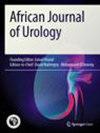Outcome of perioperative immune enhancing nutrition in patients undergoing radical cystectomy
IF 0.4
Q4 UROLOGY & NEPHROLOGY
引用次数: 0
Abstract
Since radical cystectomy is associated with relatively high perioperative morbidity and mortality, this study was conducted to evaluate the efficacy of perioperative immune nutrition in radical cystectomy patients on postoperative outcomes including wound healing, postoperative complications, either infectious or non-infectious, and length of hospital stay. This prospective, randomized controlled study was conducted between June 2022 and November 2023. Forty-two patients who had undergone radical cystectomy with ileal conduit were randomized into two groups: the immune nutrition group, which received perioperative immune nutrition, and the conventional group, which did not receive immune nutrition. Patients were followed up for 30 days postoperatively to assess wound healing, infectious and non-infectious complications, and the length of hospital stay. Patients who received immune nutrition had significantly lower postoperative infectious complications (19.0 vs 61.9%; P = 0.004), shorter hospital stay (16.57 ± 3.74 vs 20.38 ± 5.97; P = 0.01) and shorter ICU stay (2.60 ± 1.07 vs 7.09 ± 7.50; P = 0.029). The proper wound healing was significantly higher in the immune nutrition group (90.5 vs 52.4%; P = 0.006). However, there was no significant difference between both groups in the rate of non-infectious complications (28.5% vs. 57.1%, P = 0.061). Perioperative immune nutrition is associated with improved wound healing, reduced infectious complications, and reduced length of hospital stay. Trial registration clinicaltrials.gov, NCT05822518. Registered 1 April 2023—Retrospectively registered, https://clinicaltrials.gov/study/NCT05822518 .根治性膀胱切除术患者围手术期免疫增强营养的效果
由于根治性膀胱切除术的围手术期发病率和死亡率相对较高,本研究旨在评估根治性膀胱切除术患者围手术期免疫营养对术后结果的影响,包括伤口愈合、术后感染性或非感染性并发症以及住院时间。这项前瞻性随机对照研究于 2022 年 6 月至 2023 年 11 月期间进行。42名接受根治性膀胱切除术和回肠导管的患者被随机分为两组:免疫营养组和常规组,前者接受围手术期免疫营养,后者不接受免疫营养。术后对患者进行了 30 天的随访,以评估伤口愈合情况、感染性和非感染性并发症以及住院时间。接受免疫营养的患者术后感染性并发症明显降低(19.0 vs 61.9%; P = 0.004),住院时间明显缩短(16.57 ± 3.74 vs 20.38 ± 5.97; P = 0.01),重症监护室住院时间明显缩短(2.60 ± 1.07 vs 7.09 ± 7.50; P = 0.029)。免疫营养组的伤口愈合率明显更高(90.5% vs 52.4%;P = 0.006)。然而,两组的非感染性并发症发生率没有明显差异(28.5% vs. 57.1%,P = 0.061)。围手术期免疫营养与改善伤口愈合、减少感染性并发症和缩短住院时间有关。试验注册 clinicaltrials.gov,NCT05822518。2023年4月1日注册-回顾性注册,https://clinicaltrials.gov/study/NCT05822518 。
本文章由计算机程序翻译,如有差异,请以英文原文为准。
求助全文
约1分钟内获得全文
求助全文

 求助内容:
求助内容: 应助结果提醒方式:
应助结果提醒方式:


